University Nursing Report: CASN Gerontological Competencies Analysis
VerifiedAdded on 2022/08/20
|7
|1709
|8
Report
AI Summary
This report examines two key indicators (1.2 and 3.6) from the Canadian Association of School Nursing (CASN)’s entry-to-practice gerontological competencies. The report begins by highlighting the increasing elderly population and the need for specialized gerontological nursing, which aims to promote healthy aging and address diverse health needs. Indicator 1.2 focuses on engaging in therapeutic relationships, respecting values, and recognizing diversities, while indicator 3.6 emphasizes providing comfort and support to dying older adults, aligned with their wishes, spirituality, and culture. Challenges associated with these indicators include a lack of culturally sensitive care and the overlooking of spiritual needs at the end of life, leading to dissatisfaction and isolation. The report explores how nurses can utilize communication skills, cultural sensitivity, and spiritual assessment to meet these challenges. The conclusion emphasizes the importance of training nurses to provide holistic, culturally competent care to enhance the quality of life for elderly patients.
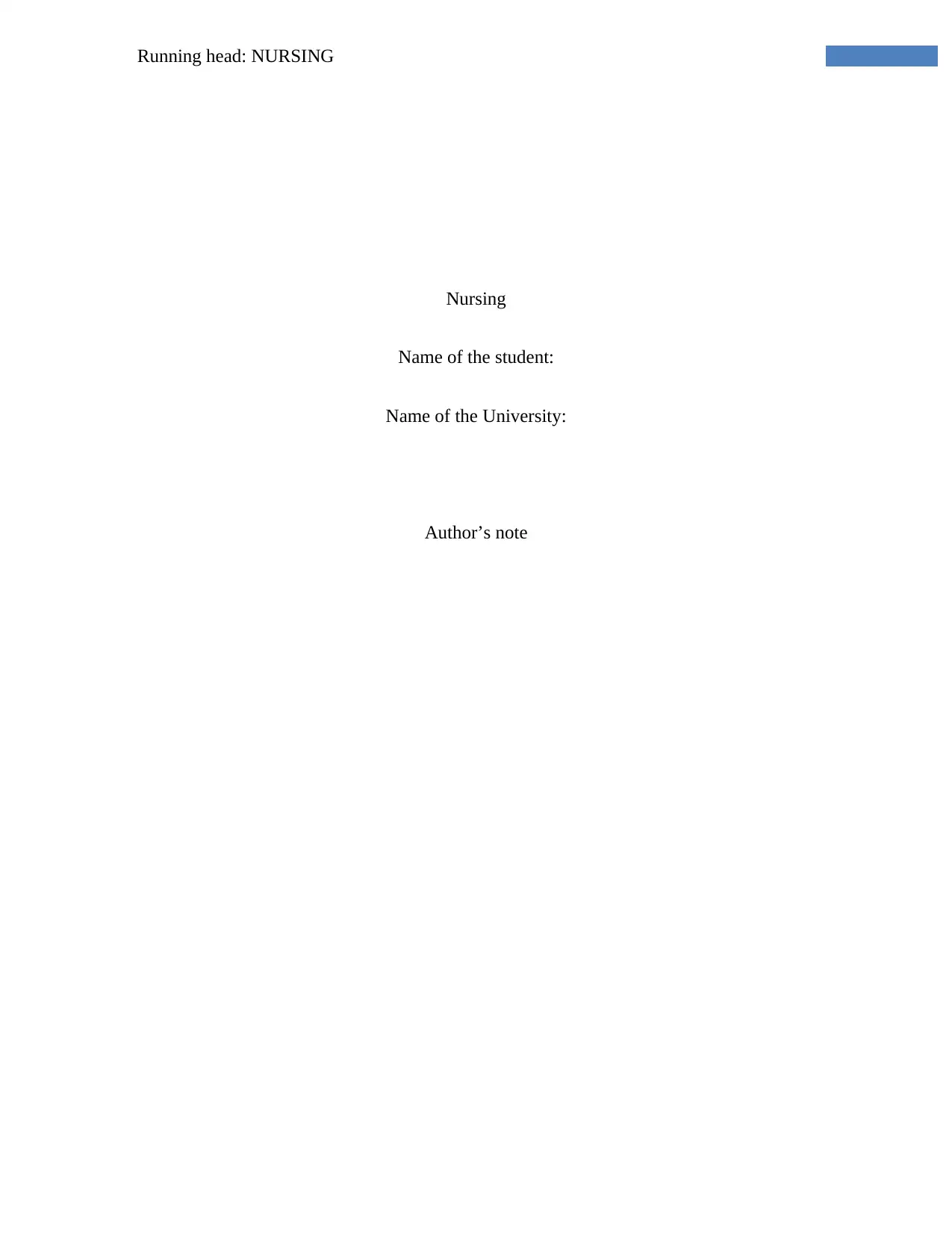
Running head: NURSING
Nursing
Name of the student:
Name of the University:
Author’s note
Nursing
Name of the student:
Name of the University:
Author’s note
Paraphrase This Document
Need a fresh take? Get an instant paraphrase of this document with our AI Paraphraser
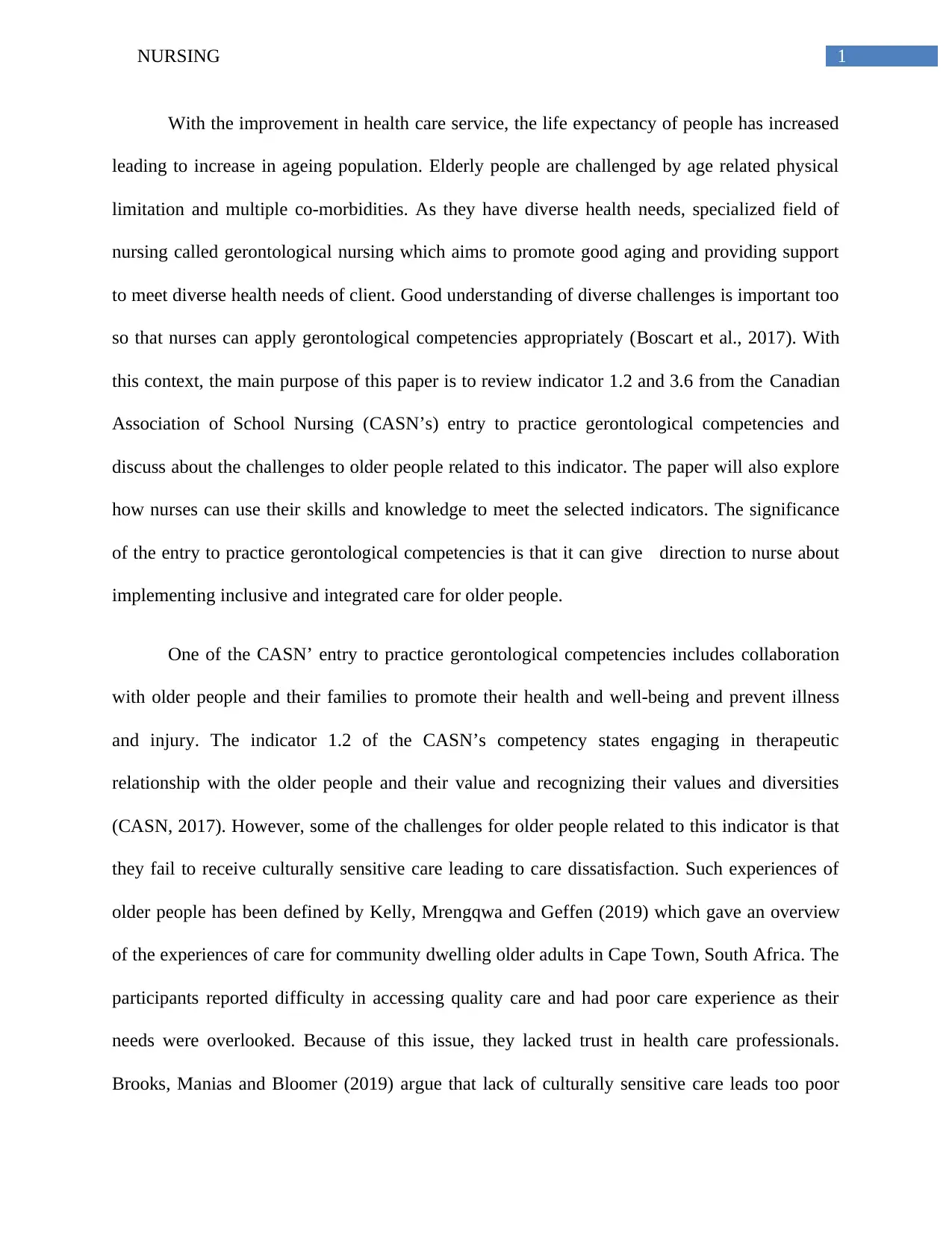
1NURSING
With the improvement in health care service, the life expectancy of people has increased
leading to increase in ageing population. Elderly people are challenged by age related physical
limitation and multiple co-morbidities. As they have diverse health needs, specialized field of
nursing called gerontological nursing which aims to promote good aging and providing support
to meet diverse health needs of client. Good understanding of diverse challenges is important too
so that nurses can apply gerontological competencies appropriately (Boscart et al., 2017). With
this context, the main purpose of this paper is to review indicator 1.2 and 3.6 from the Canadian
Association of School Nursing (CASN’s) entry to practice gerontological competencies and
discuss about the challenges to older people related to this indicator. The paper will also explore
how nurses can use their skills and knowledge to meet the selected indicators. The significance
of the entry to practice gerontological competencies is that it can give direction to nurse about
implementing inclusive and integrated care for older people.
One of the CASN’ entry to practice gerontological competencies includes collaboration
with older people and their families to promote their health and well-being and prevent illness
and injury. The indicator 1.2 of the CASN’s competency states engaging in therapeutic
relationship with the older people and their value and recognizing their values and diversities
(CASN, 2017). However, some of the challenges for older people related to this indicator is that
they fail to receive culturally sensitive care leading to care dissatisfaction. Such experiences of
older people has been defined by Kelly, Mrengqwa and Geffen (2019) which gave an overview
of the experiences of care for community dwelling older adults in Cape Town, South Africa. The
participants reported difficulty in accessing quality care and had poor care experience as their
needs were overlooked. Because of this issue, they lacked trust in health care professionals.
Brooks, Manias and Bloomer (2019) argue that lack of culturally sensitive care leads too poor
With the improvement in health care service, the life expectancy of people has increased
leading to increase in ageing population. Elderly people are challenged by age related physical
limitation and multiple co-morbidities. As they have diverse health needs, specialized field of
nursing called gerontological nursing which aims to promote good aging and providing support
to meet diverse health needs of client. Good understanding of diverse challenges is important too
so that nurses can apply gerontological competencies appropriately (Boscart et al., 2017). With
this context, the main purpose of this paper is to review indicator 1.2 and 3.6 from the Canadian
Association of School Nursing (CASN’s) entry to practice gerontological competencies and
discuss about the challenges to older people related to this indicator. The paper will also explore
how nurses can use their skills and knowledge to meet the selected indicators. The significance
of the entry to practice gerontological competencies is that it can give direction to nurse about
implementing inclusive and integrated care for older people.
One of the CASN’ entry to practice gerontological competencies includes collaboration
with older people and their families to promote their health and well-being and prevent illness
and injury. The indicator 1.2 of the CASN’s competency states engaging in therapeutic
relationship with the older people and their value and recognizing their values and diversities
(CASN, 2017). However, some of the challenges for older people related to this indicator is that
they fail to receive culturally sensitive care leading to care dissatisfaction. Such experiences of
older people has been defined by Kelly, Mrengqwa and Geffen (2019) which gave an overview
of the experiences of care for community dwelling older adults in Cape Town, South Africa. The
participants reported difficulty in accessing quality care and had poor care experience as their
needs were overlooked. Because of this issue, they lacked trust in health care professionals.
Brooks, Manias and Bloomer (2019) argue that lack of culturally sensitive care leads too poor
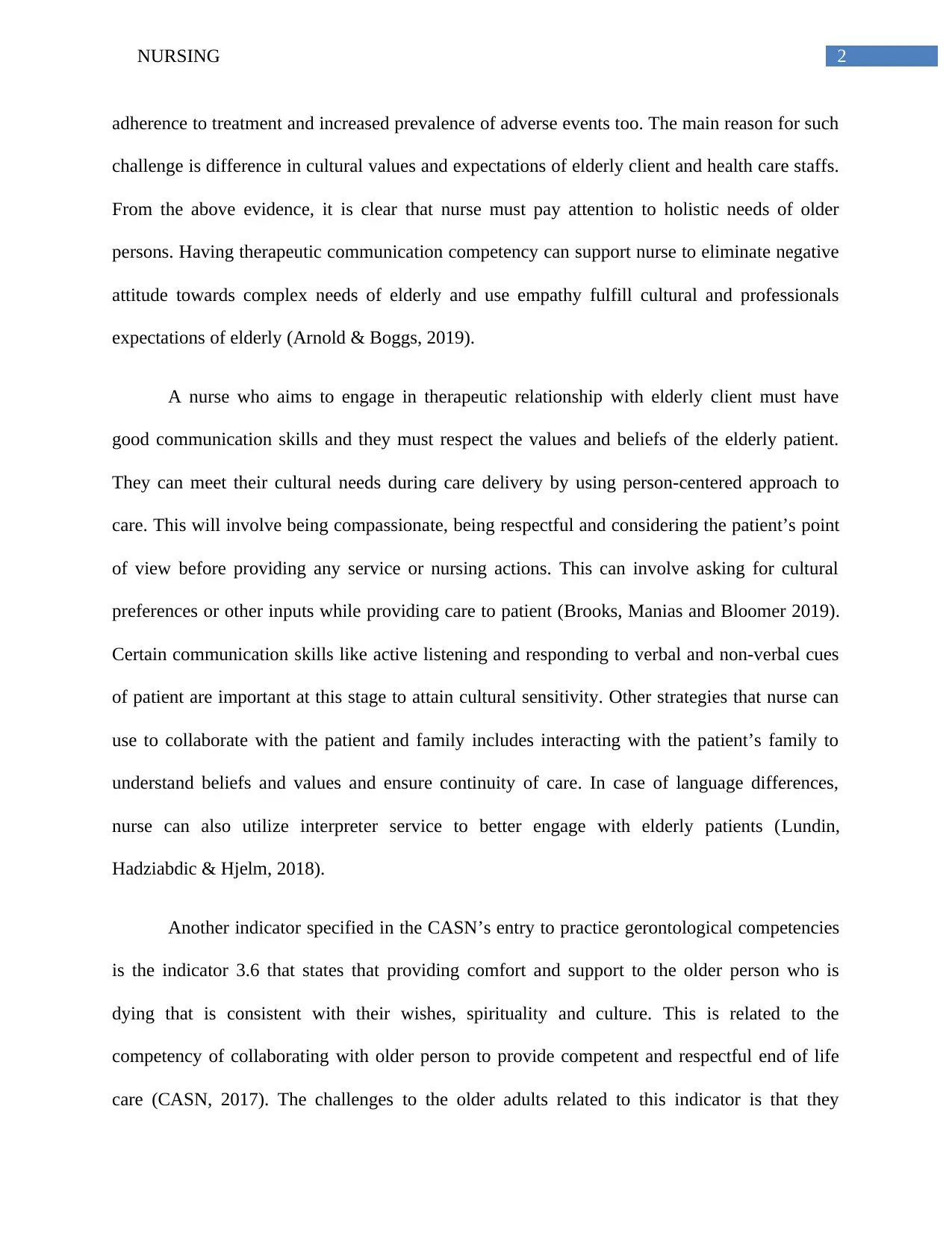
2NURSING
adherence to treatment and increased prevalence of adverse events too. The main reason for such
challenge is difference in cultural values and expectations of elderly client and health care staffs.
From the above evidence, it is clear that nurse must pay attention to holistic needs of older
persons. Having therapeutic communication competency can support nurse to eliminate negative
attitude towards complex needs of elderly and use empathy fulfill cultural and professionals
expectations of elderly (Arnold & Boggs, 2019).
A nurse who aims to engage in therapeutic relationship with elderly client must have
good communication skills and they must respect the values and beliefs of the elderly patient.
They can meet their cultural needs during care delivery by using person-centered approach to
care. This will involve being compassionate, being respectful and considering the patient’s point
of view before providing any service or nursing actions. This can involve asking for cultural
preferences or other inputs while providing care to patient (Brooks, Manias and Bloomer 2019).
Certain communication skills like active listening and responding to verbal and non-verbal cues
of patient are important at this stage to attain cultural sensitivity. Other strategies that nurse can
use to collaborate with the patient and family includes interacting with the patient’s family to
understand beliefs and values and ensure continuity of care. In case of language differences,
nurse can also utilize interpreter service to better engage with elderly patients (Lundin,
Hadziabdic & Hjelm, 2018).
Another indicator specified in the CASN’s entry to practice gerontological competencies
is the indicator 3.6 that states that providing comfort and support to the older person who is
dying that is consistent with their wishes, spirituality and culture. This is related to the
competency of collaborating with older person to provide competent and respectful end of life
care (CASN, 2017). The challenges to the older adults related to this indicator is that they
adherence to treatment and increased prevalence of adverse events too. The main reason for such
challenge is difference in cultural values and expectations of elderly client and health care staffs.
From the above evidence, it is clear that nurse must pay attention to holistic needs of older
persons. Having therapeutic communication competency can support nurse to eliminate negative
attitude towards complex needs of elderly and use empathy fulfill cultural and professionals
expectations of elderly (Arnold & Boggs, 2019).
A nurse who aims to engage in therapeutic relationship with elderly client must have
good communication skills and they must respect the values and beliefs of the elderly patient.
They can meet their cultural needs during care delivery by using person-centered approach to
care. This will involve being compassionate, being respectful and considering the patient’s point
of view before providing any service or nursing actions. This can involve asking for cultural
preferences or other inputs while providing care to patient (Brooks, Manias and Bloomer 2019).
Certain communication skills like active listening and responding to verbal and non-verbal cues
of patient are important at this stage to attain cultural sensitivity. Other strategies that nurse can
use to collaborate with the patient and family includes interacting with the patient’s family to
understand beliefs and values and ensure continuity of care. In case of language differences,
nurse can also utilize interpreter service to better engage with elderly patients (Lundin,
Hadziabdic & Hjelm, 2018).
Another indicator specified in the CASN’s entry to practice gerontological competencies
is the indicator 3.6 that states that providing comfort and support to the older person who is
dying that is consistent with their wishes, spirituality and culture. This is related to the
competency of collaborating with older person to provide competent and respectful end of life
care (CASN, 2017). The challenges to the older adults related to this indicator is that they
⊘ This is a preview!⊘
Do you want full access?
Subscribe today to unlock all pages.

Trusted by 1+ million students worldwide
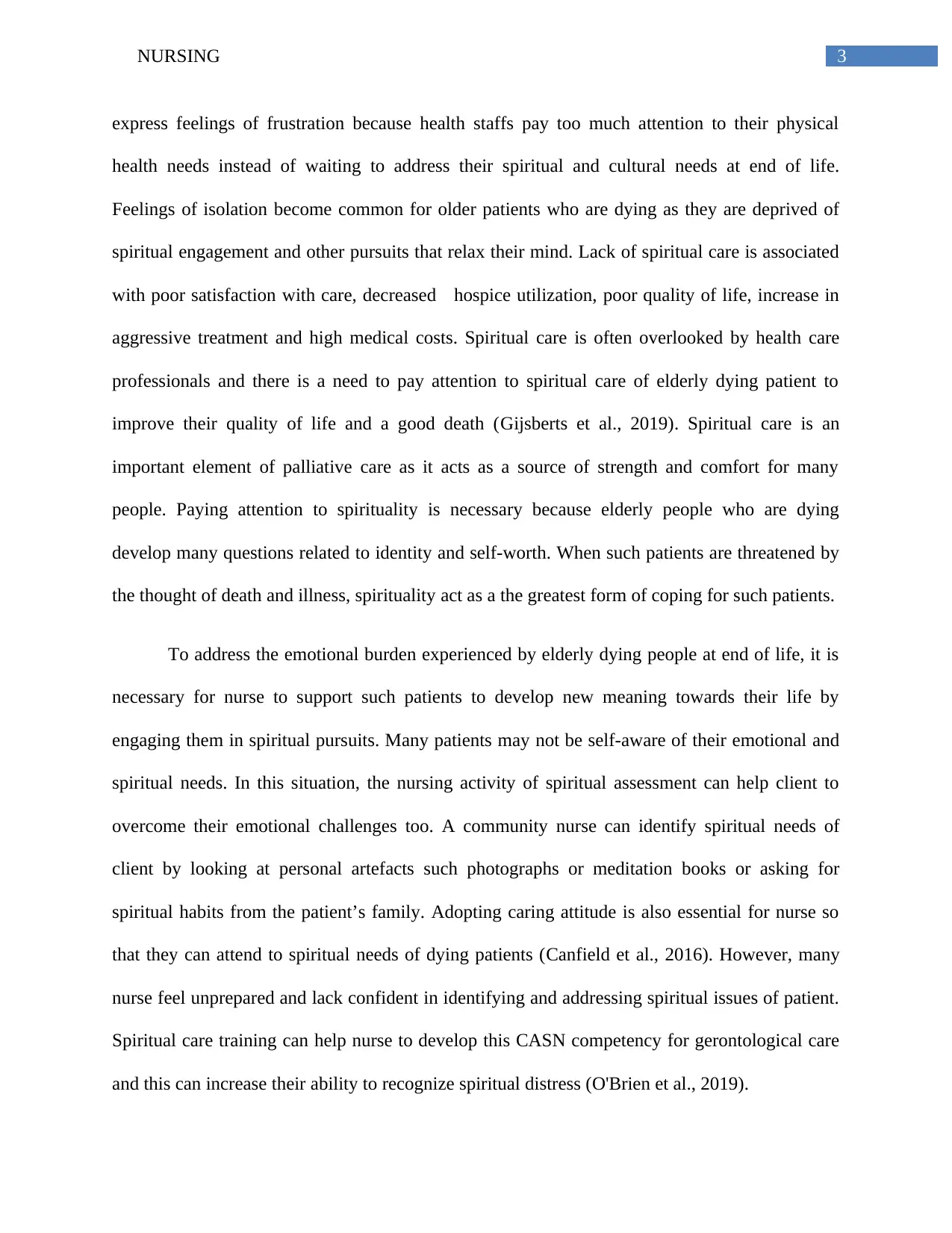
3NURSING
express feelings of frustration because health staffs pay too much attention to their physical
health needs instead of waiting to address their spiritual and cultural needs at end of life.
Feelings of isolation become common for older patients who are dying as they are deprived of
spiritual engagement and other pursuits that relax their mind. Lack of spiritual care is associated
with poor satisfaction with care, decreased hospice utilization, poor quality of life, increase in
aggressive treatment and high medical costs. Spiritual care is often overlooked by health care
professionals and there is a need to pay attention to spiritual care of elderly dying patient to
improve their quality of life and a good death (Gijsberts et al., 2019). Spiritual care is an
important element of palliative care as it acts as a source of strength and comfort for many
people. Paying attention to spirituality is necessary because elderly people who are dying
develop many questions related to identity and self-worth. When such patients are threatened by
the thought of death and illness, spirituality act as a the greatest form of coping for such patients.
To address the emotional burden experienced by elderly dying people at end of life, it is
necessary for nurse to support such patients to develop new meaning towards their life by
engaging them in spiritual pursuits. Many patients may not be self-aware of their emotional and
spiritual needs. In this situation, the nursing activity of spiritual assessment can help client to
overcome their emotional challenges too. A community nurse can identify spiritual needs of
client by looking at personal artefacts such photographs or meditation books or asking for
spiritual habits from the patient’s family. Adopting caring attitude is also essential for nurse so
that they can attend to spiritual needs of dying patients (Canfield et al., 2016). However, many
nurse feel unprepared and lack confident in identifying and addressing spiritual issues of patient.
Spiritual care training can help nurse to develop this CASN competency for gerontological care
and this can increase their ability to recognize spiritual distress (O'Brien et al., 2019).
express feelings of frustration because health staffs pay too much attention to their physical
health needs instead of waiting to address their spiritual and cultural needs at end of life.
Feelings of isolation become common for older patients who are dying as they are deprived of
spiritual engagement and other pursuits that relax their mind. Lack of spiritual care is associated
with poor satisfaction with care, decreased hospice utilization, poor quality of life, increase in
aggressive treatment and high medical costs. Spiritual care is often overlooked by health care
professionals and there is a need to pay attention to spiritual care of elderly dying patient to
improve their quality of life and a good death (Gijsberts et al., 2019). Spiritual care is an
important element of palliative care as it acts as a source of strength and comfort for many
people. Paying attention to spirituality is necessary because elderly people who are dying
develop many questions related to identity and self-worth. When such patients are threatened by
the thought of death and illness, spirituality act as a the greatest form of coping for such patients.
To address the emotional burden experienced by elderly dying people at end of life, it is
necessary for nurse to support such patients to develop new meaning towards their life by
engaging them in spiritual pursuits. Many patients may not be self-aware of their emotional and
spiritual needs. In this situation, the nursing activity of spiritual assessment can help client to
overcome their emotional challenges too. A community nurse can identify spiritual needs of
client by looking at personal artefacts such photographs or meditation books or asking for
spiritual habits from the patient’s family. Adopting caring attitude is also essential for nurse so
that they can attend to spiritual needs of dying patients (Canfield et al., 2016). However, many
nurse feel unprepared and lack confident in identifying and addressing spiritual issues of patient.
Spiritual care training can help nurse to develop this CASN competency for gerontological care
and this can increase their ability to recognize spiritual distress (O'Brien et al., 2019).
Paraphrase This Document
Need a fresh take? Get an instant paraphrase of this document with our AI Paraphraser

4NURSING
From the review of CASN’s 1.2 and 3.6 indicator for gerontological competencies, it can
be concluded that two major challenges faced by elderly patient includes lack of fulfillment of
cultural care needs of elderly client and ignorance of their spiritual needs at end of life. Elderly
people often report getting frustrated because of overlooking of their cultural values. In addition,
elderly dying patients are often irritated by emotional conflicts in their mind and the struggle to
find meaning in their life. The nursing communication skills, compassion and skills related to
cultural sensitivity support them to overcome the above challenges faced by nurses. Entry to
practice nurse must take necessary training so that they deliver care to elderly patients with an
understanding of their culture and social support networks.
From the review of CASN’s 1.2 and 3.6 indicator for gerontological competencies, it can
be concluded that two major challenges faced by elderly patient includes lack of fulfillment of
cultural care needs of elderly client and ignorance of their spiritual needs at end of life. Elderly
people often report getting frustrated because of overlooking of their cultural values. In addition,
elderly dying patients are often irritated by emotional conflicts in their mind and the struggle to
find meaning in their life. The nursing communication skills, compassion and skills related to
cultural sensitivity support them to overcome the above challenges faced by nurses. Entry to
practice nurse must take necessary training so that they deliver care to elderly patients with an
understanding of their culture and social support networks.
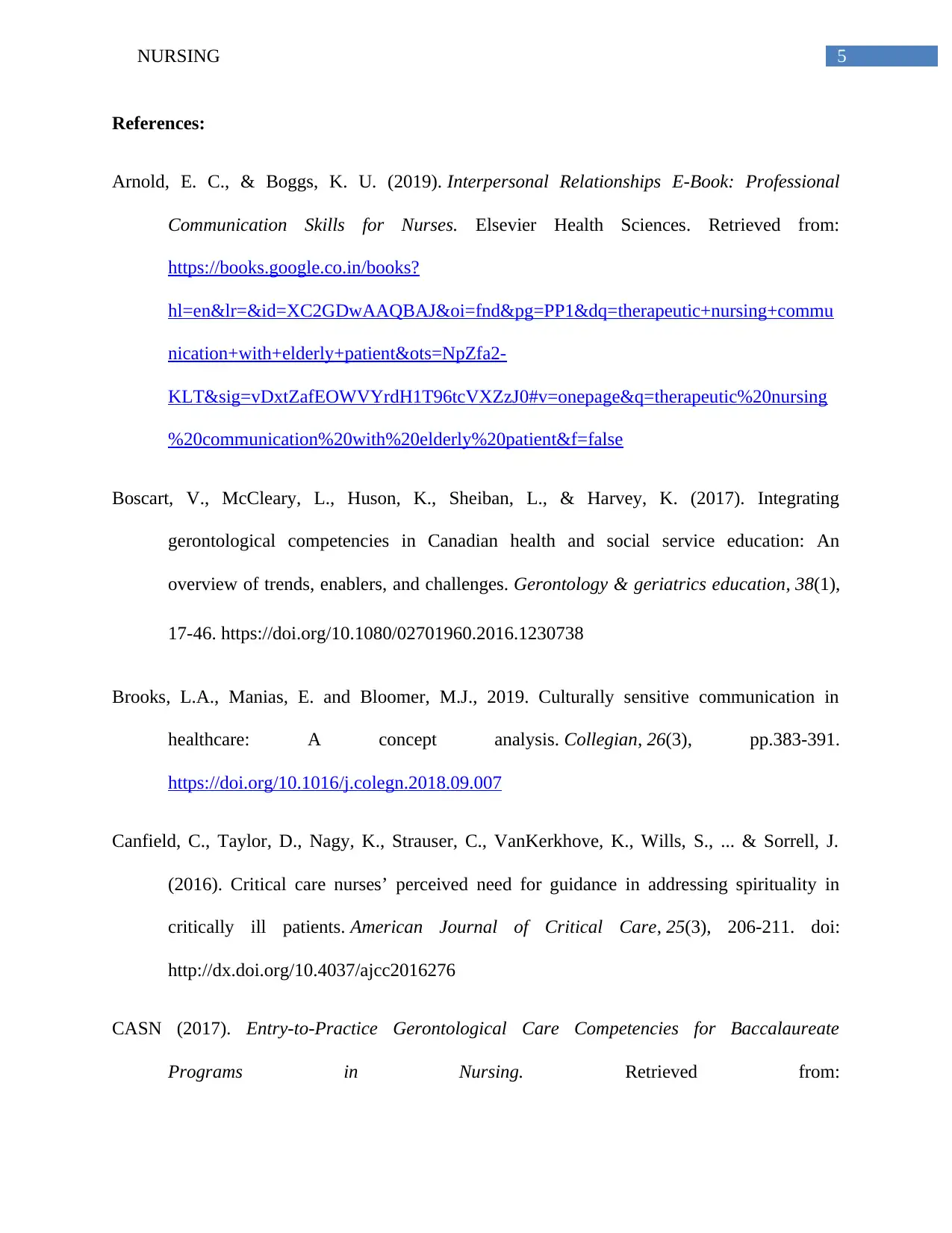
5NURSING
References:
Arnold, E. C., & Boggs, K. U. (2019). Interpersonal Relationships E-Book: Professional
Communication Skills for Nurses. Elsevier Health Sciences. Retrieved from:
https://books.google.co.in/books?
hl=en&lr=&id=XC2GDwAAQBAJ&oi=fnd&pg=PP1&dq=therapeutic+nursing+commu
nication+with+elderly+patient&ots=NpZfa2-
KLT&sig=vDxtZafEOWVYrdH1T96tcVXZzJ0#v=onepage&q=therapeutic%20nursing
%20communication%20with%20elderly%20patient&f=false
Boscart, V., McCleary, L., Huson, K., Sheiban, L., & Harvey, K. (2017). Integrating
gerontological competencies in Canadian health and social service education: An
overview of trends, enablers, and challenges. Gerontology & geriatrics education, 38(1),
17-46. https://doi.org/10.1080/02701960.2016.1230738
Brooks, L.A., Manias, E. and Bloomer, M.J., 2019. Culturally sensitive communication in
healthcare: A concept analysis. Collegian, 26(3), pp.383-391.
https://doi.org/10.1016/j.colegn.2018.09.007
Canfield, C., Taylor, D., Nagy, K., Strauser, C., VanKerkhove, K., Wills, S., ... & Sorrell, J.
(2016). Critical care nurses’ perceived need for guidance in addressing spirituality in
critically ill patients. American Journal of Critical Care, 25(3), 206-211. doi:
http://dx.doi.org/10.4037/ajcc2016276
CASN (2017). Entry-to-Practice Gerontological Care Competencies for Baccalaureate
Programs in Nursing. Retrieved from:
References:
Arnold, E. C., & Boggs, K. U. (2019). Interpersonal Relationships E-Book: Professional
Communication Skills for Nurses. Elsevier Health Sciences. Retrieved from:
https://books.google.co.in/books?
hl=en&lr=&id=XC2GDwAAQBAJ&oi=fnd&pg=PP1&dq=therapeutic+nursing+commu
nication+with+elderly+patient&ots=NpZfa2-
KLT&sig=vDxtZafEOWVYrdH1T96tcVXZzJ0#v=onepage&q=therapeutic%20nursing
%20communication%20with%20elderly%20patient&f=false
Boscart, V., McCleary, L., Huson, K., Sheiban, L., & Harvey, K. (2017). Integrating
gerontological competencies in Canadian health and social service education: An
overview of trends, enablers, and challenges. Gerontology & geriatrics education, 38(1),
17-46. https://doi.org/10.1080/02701960.2016.1230738
Brooks, L.A., Manias, E. and Bloomer, M.J., 2019. Culturally sensitive communication in
healthcare: A concept analysis. Collegian, 26(3), pp.383-391.
https://doi.org/10.1016/j.colegn.2018.09.007
Canfield, C., Taylor, D., Nagy, K., Strauser, C., VanKerkhove, K., Wills, S., ... & Sorrell, J.
(2016). Critical care nurses’ perceived need for guidance in addressing spirituality in
critically ill patients. American Journal of Critical Care, 25(3), 206-211. doi:
http://dx.doi.org/10.4037/ajcc2016276
CASN (2017). Entry-to-Practice Gerontological Care Competencies for Baccalaureate
Programs in Nursing. Retrieved from:
⊘ This is a preview!⊘
Do you want full access?
Subscribe today to unlock all pages.

Trusted by 1+ million students worldwide
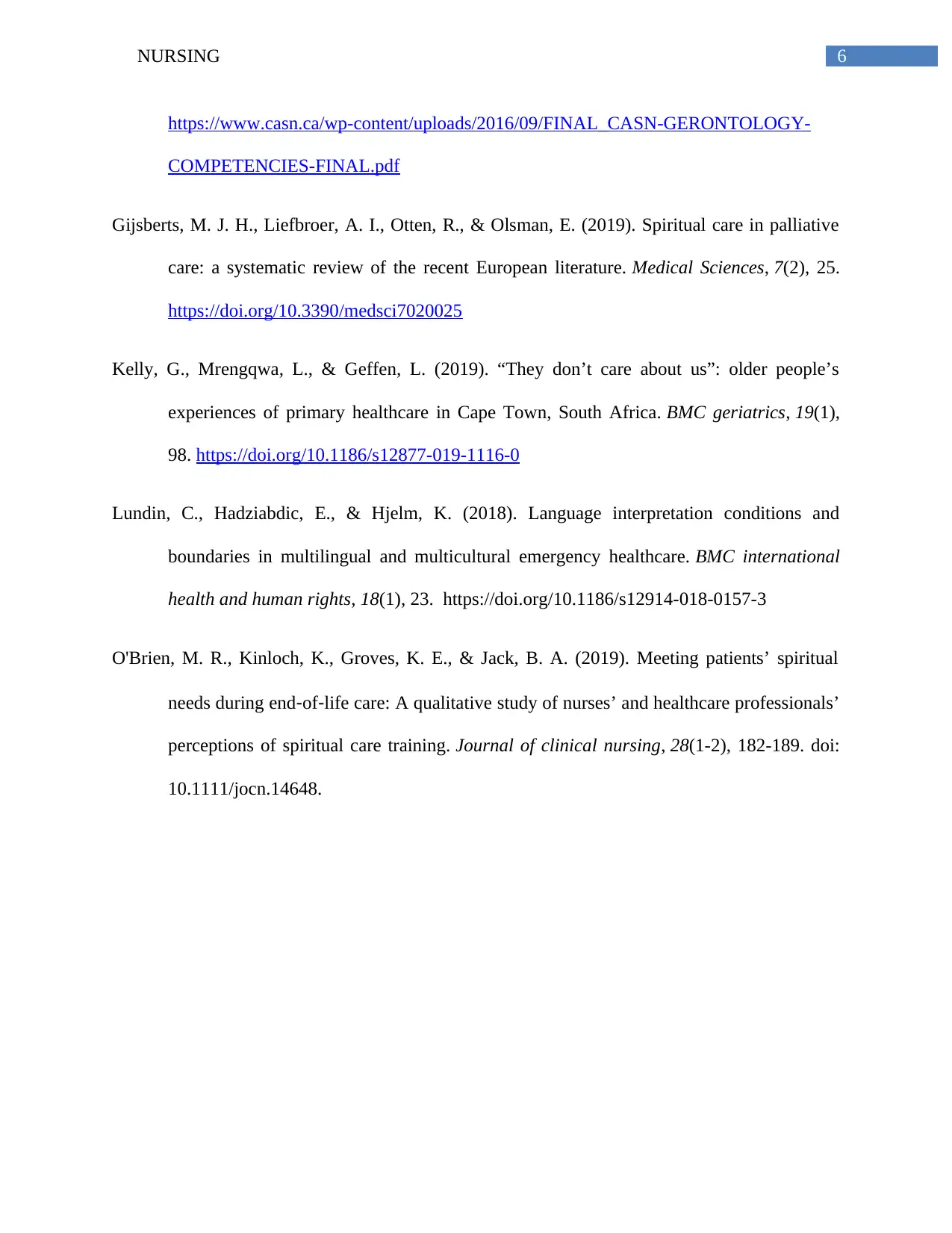
6NURSING
https://www.casn.ca/wp-content/uploads/2016/09/FINAL_CASN-GERONTOLOGY-
COMPETENCIES-FINAL.pdf
Gijsberts, M. J. H., Liefbroer, A. I., Otten, R., & Olsman, E. (2019). Spiritual care in palliative
care: a systematic review of the recent European literature. Medical Sciences, 7(2), 25.
https://doi.org/10.3390/medsci7020025
Kelly, G., Mrengqwa, L., & Geffen, L. (2019). “They don’t care about us”: older people’s
experiences of primary healthcare in Cape Town, South Africa. BMC geriatrics, 19(1),
98. https://doi.org/10.1186/s12877-019-1116-0
Lundin, C., Hadziabdic, E., & Hjelm, K. (2018). Language interpretation conditions and
boundaries in multilingual and multicultural emergency healthcare. BMC international
health and human rights, 18(1), 23. https://doi.org/10.1186/s12914-018-0157-3
O'Brien, M. R., Kinloch, K., Groves, K. E., & Jack, B. A. (2019). Meeting patients’ spiritual
needs during end‐of‐life care: A qualitative study of nurses’ and healthcare professionals’
perceptions of spiritual care training. Journal of clinical nursing, 28(1-2), 182-189. doi:
10.1111/jocn.14648.
https://www.casn.ca/wp-content/uploads/2016/09/FINAL_CASN-GERONTOLOGY-
COMPETENCIES-FINAL.pdf
Gijsberts, M. J. H., Liefbroer, A. I., Otten, R., & Olsman, E. (2019). Spiritual care in palliative
care: a systematic review of the recent European literature. Medical Sciences, 7(2), 25.
https://doi.org/10.3390/medsci7020025
Kelly, G., Mrengqwa, L., & Geffen, L. (2019). “They don’t care about us”: older people’s
experiences of primary healthcare in Cape Town, South Africa. BMC geriatrics, 19(1),
98. https://doi.org/10.1186/s12877-019-1116-0
Lundin, C., Hadziabdic, E., & Hjelm, K. (2018). Language interpretation conditions and
boundaries in multilingual and multicultural emergency healthcare. BMC international
health and human rights, 18(1), 23. https://doi.org/10.1186/s12914-018-0157-3
O'Brien, M. R., Kinloch, K., Groves, K. E., & Jack, B. A. (2019). Meeting patients’ spiritual
needs during end‐of‐life care: A qualitative study of nurses’ and healthcare professionals’
perceptions of spiritual care training. Journal of clinical nursing, 28(1-2), 182-189. doi:
10.1111/jocn.14648.
1 out of 7
Related Documents
Your All-in-One AI-Powered Toolkit for Academic Success.
+13062052269
info@desklib.com
Available 24*7 on WhatsApp / Email
![[object Object]](/_next/static/media/star-bottom.7253800d.svg)
Unlock your academic potential
Copyright © 2020–2026 A2Z Services. All Rights Reserved. Developed and managed by ZUCOL.





